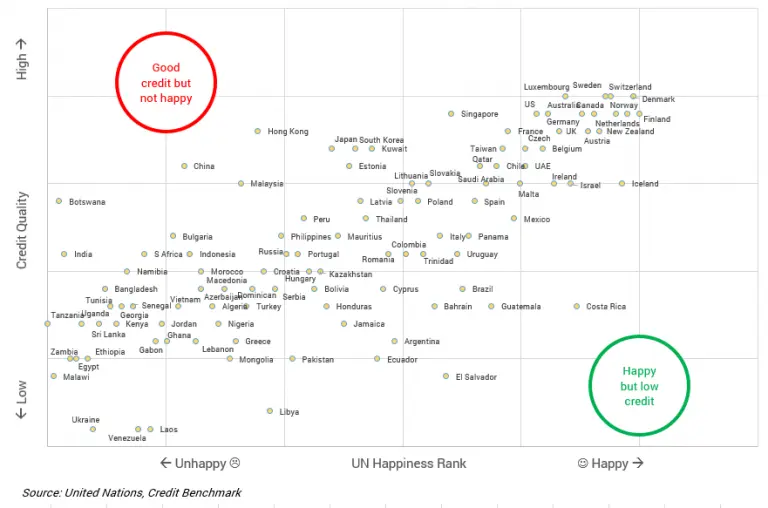The UN recently released their 7th World Happiness Report, which ranks 156 countries by how happy their citizens perceive themselves to be.
The results of the report are not altogether unsurprising – nations with strong social welfare systems and high GDP per capita tend to sit at the top (the Nordics take 5 of the top 7 rankings, with Netherlands and Switzerland separating Sweden from the remaining 4).
At the bottom, we see a cluster of nations experiencing conflict, political upheaval, and poverty, with war-torn South Sudan in the unenviable position of being the country with the unhappiest citizens.
But does a nation of happy (or unhappy) people mean that Sovereign credit quality will follow suit? Credit Benchmark consensus credit risk data, which is sourced from 30+ of the world’s leading financial institutions, shows that the relationship between the two factors is not always linear. The below chart measures the results of the UN World Happiness Report (with happiness tracked on the x axis) against Credit Benchmark’s dataset of Sovereign credit quality (Sovereign consensus rating is tracked on the y axis).

We observe that the Nordics, Central Europeans, US, UK, Australia, Canada and New Zealand, averaging an aa consensus rating, rate highly in both categories and are therefore clustered in the upper right of the chart.
However, there are a subset of countries that seem conversely happy, but of a low credit quality. Central and Southern American nations feature strongly in this category, with Costa Rica (bb-) demonstrating high levels of happiness and low credit worthiness. Guatemala (bb-) and El Salvador (ccc+) display a similar relationship.
Costa Rica, for example, has recently experienced wide fiscal deficits, high near-term financing needs and budget restraints, with the government passing a fiscal reform in late December 2018. But Costa Rica also enjoys a reputation for a relaxed pace of life and relatively good levels of health and welfare – clearly a recipe for happiness.
East Asian nations including China (a+), Hong Kong (aa) and Malaysia (a) offer an alternative picture, veering towards the lower end of the happiness scale but boasting relatively high credit quality. Despite robust financial health, these populations score low on happiness.
It is worth noting that the results of the Gallup World Poll, which the Happiness Report is based on, takes into consideration data gathered between 2016-2018, whereas Credit Benchmark’s consensus Sovereign credit data is updated monthly. It is possible that recent Sovereign-specific factors (e.g. radical political reform in Malaysia, and fiscal tightening in Costa Rica) may lead to a longer-term changes in reported national happiness – both for good and for bad.
